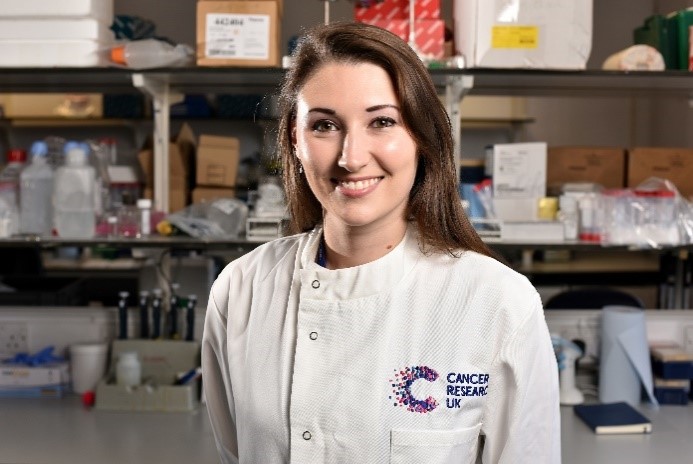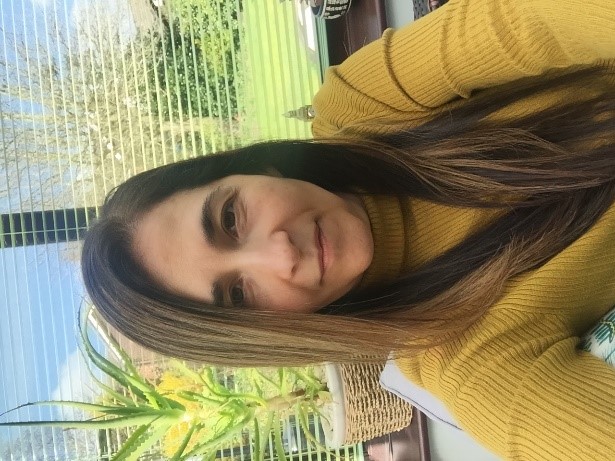How scientists and QA managers contribute towards cancer research in the ECMC network
With the ease of lockdown and the reopening of research labs, we spoke to a scientist and a quality assurance (QA) manager to understand more about their roles, and asked them to share what they are looking forward to and their thoughts on upcoming challenges.
Catherine Pointer, Southampton ECMC
 What is the most rewarding and significant part of being a translational scientist?
What is the most rewarding and significant part of being a translational scientist?
For me it is knowing that I am helping improve medicine and changing cancer therapies to be more effective at saving life and less damaging to patients’ long term. I’ve had a lot of personal experience with cancer and so for me it’s not just helping other people but also helping improve my own future and the futures of those around me. This context has the additional effect of making my job more satisfying and enjoyable day to day.
How does your work contribute to cancer studies?
Within the Southampton ECMC we are running many cancer clinical trials, most of which are early phase. Assessing dosage, safety and tertiary endpoints of new drugs/combinations of drugs is essential to directing later phase trials and ultimately changing medical practice for the better.
What is the most challenging part of your role?
Each trial comes with its own challenges. It can be difficult to prioritise when several trials all have imminent deadlines. For the most part the science is straightforward, and I can get my head around it fairly easily or with a little work. One of the main trial challenges we have is receiving samples from other hospitals around the UK. Samples may arrive late or without correct paperwork which can be very difficult to resolve.
Beyond that, organising people and office politics can be a tricky aspect that you have to learn through experience. It’s certainly been a tough one during lockdown!
What are you most looking forward to when you return to work after COVID-19?
Getting out of my house! Having a routine again and variety (lab work, not just office work).
How do you think the lab environment will change after COVID-19?
We have already implemented a booking system where only a certain number of people are allowed in the lab at any one time. We now have a one-way system in the lab, signing in and out sheet for everyone (used to just be visitors). There’s 2m social distancing at all times and any office work must be done from home. I hope over time things will gradually return to ‘normal’ but I’m sure it will take a long time. I wonder if working from home will become a more common practice. Previously a lot of us would go in to work even if we just had office work to do because we were worried about looking lazy. Lockdown has proven we can work well from home so it might become the new norm.
Lulu Cvetkovic, Newcastle ECMC
 What is the most rewarding and significant part of being a QA Manager?
What is the most rewarding and significant part of being a QA Manager?
There are so many rewarding things about my job; I love the variety of the role - no two days are ever the same. Although I have to stick to an audit schedule, there are also a lot of other opportunities that I am given, such as evaluating computer systems, working with my group to look at business process improvement and streamlining our processes etc. I would also like to acknowledge how great it is being part of such an amazing group (the pharmacology group led by Professor Gareth Veal), and also being part of the ECMC who have provided lots of valuable training and where I have made so many fantastic contacts.
How does your work contribute to cancer studies?
My role aims to ensure that everything that we do within the laboratory is within the applicable regulations and in making sure that staff are fully trained and aware of the procedures that they need to follow. It's about making sure that the results that we generate are 100% accurate and reliable and that we have robust processes in place - this is especially important in studies where the data that we produce impacts patient treatment directly.
What is the most challenging part of your role?
The most challenging part of my role is getting everything done - there never seem to be enough hours in the day. Before my work day has started, I have a rough plan in my head of what I hope to achieve that day. Unexpected things can often crop up which can divert me from my original plan and which I need to try and factor in. There definitely needs to be an element of flexibility in this role.
What are you most looking forward to when you return to work after COVID-19?
I am looking forward to returning to a new sense of 'normality' and routine, but most of all to seeing the other members of my group. We keep in touch regularly - we have coffee mornings over Microsoft Teams every day, but it’s not the same and I really miss them all.
How do you think the lab environment will change after COVID-19?
Things are constantly changing and will probably continue to change for some time yet. The COVID-19 pandemic has given us time to look at and evaluate our current ways of working. I can definitely see us moving to more electronic-based, rather than paper-based systems - we were already starting to move in this direction. I think staff may also work more flexibly, with non-lab work (for example writing up experiments) possibly being done from home rather than in the lab.
A lot of the in-house training that we have had to do has been done over Microsoft Teams or Zoom, which although a little strange at first, worked really well. There may also be the possibility of introducing remote auditing. There are definitely lots of exciting times ahead!
